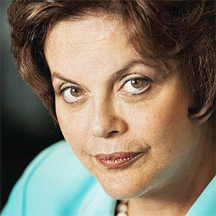You have to give credit to Brazil for what it’s doing to combat corruption and solve the worst political scandal in the country’s recent history.
 It’s not unusual for Latin American countries to prosecute politicians for real or imagined corrupt practices; in fact, most new governments go after their political rivals from preceding governments as soon as they can. But Brazil is doing something much more noteworthy: it is prosecuting prominent leaders of the ruling party.
It’s not unusual for Latin American countries to prosecute politicians for real or imagined corrupt practices; in fact, most new governments go after their political rivals from preceding governments as soon as they can. But Brazil is doing something much more noteworthy: it is prosecuting prominent leaders of the ruling party.
Thirty-eight top officials and allies of President Dilma Rousseff and former President Luis Inácio Lula da Silva’s Workers Party, including Lula da Silva‘s former all-powerful chief of staff Jose Dirceu, are being tried before Brazil’s Supreme Court for diverting public funds to buy votes in Congress between 2002 and 2005.
The hearings, which started August 2 and are expected to last for several weeks, are being dubbed by the Brazilian press as “the trial of the century.”
They focus on what Brazilians refer to as the mensalao, or monthly allowances, that were allegedly paid by the government to lawmakers, which have resulted in 1,089 charges of corruption, misuse of public funds, embezzlement and money laundering.
While neither Rousseff nor Lula da Silva face charges, there is a consensus that the former president’s image would be hurt if some of his former top advisers are convicted.
Rousseff, a Lula da Silva protege who remains close to him, may come out of this even stronger.
She is enjoying a record 70 per cent personal popularity rate, higher than Lula da Silva’s at this point during his presidency, in large part thanks to her anti-corruption offensive.
A former guerrilla turned no-nonsense politician — I happened to sit only a few feet away from her during her public appearance with President Barack Obama at the recent Summit of the Americas in Cartagena, Colombia, and I didn’t see her smile even once — Rousseff has already fired more than a half-dozen ministers on corruption allegations since she took office in January 2011.
“The fact that the country is able to take up this issue in a world where there is so much corruption is good news,” says Albert Fishlow, a Columbia University professor emeritus of Brazilian studies.
“All of these individuals facing charges have used the legal system to avoid judgment for a number of years. At the end of it, rather than simply letting it disappear, the Brazilian judiciary as an institution has proved to function probably better than that of virtually any other Latin American country,” he added.

Paulo Sotero, a head of the Brazil Institute at the Wilson Center in Washington DC, agrees.
The fact that this trial is taking place only a few months before Brazil’s key municipal elections in October, and at a time when the economy is slowing down, is further evidence of the healthy separation of powers in Brazil, he told me.
“What we are seeing here is institutions that work,” Sotero said.
During Rousseff’s term, in addition to the layoffs of several government ministers, Brazilians have seen other key anti-corruption moves, including the implementation of a “clean record” law that does not allow politicians to run for office if they have been found guilty of a crime.
My opinion: I’m not a great fan of Rousseff’s foreign policy, which — although perhaps not as bad as Lula da Silva’s — has a pretty bad record when it comes to the collective defence of democracy and human rights around the world. But domestically, she deserves high credit for her anti-corruption drive.
While Brazil is cracking down on government corruption, most of its neighbours are turning a blind eye to it. In Argentina, President Cristina Fernández de Kirchner has virtually ignored a huge corruption scandal involving Vice President Amado Boudou’s alleged ties to the government’s money-printing company.
In Venezuela, President Hugo Chávez not only failed to fire military commander General Henry Rangel Silva after Washington accused him of drug trafficking ties in 2008, but promoted him to defence minister earlier this year.
In Ecuador, President Rafael Correa and friendly judges are trying to shelve an investigation into up to $120 million in government construction contracts with the President’s brother Fabricio Correa, which have been publicly confirmed by the latter.
The outcome of Brazil’s “trial of the century” is still unclear.
But, for now, Rousseff is a role model in the region: she is going after corrupt politicians, no matter how close they are to her own office.
© The Miami Herald, 2012. Distributed by Knight Ridder/Tribune Media Services.





